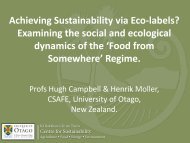Book of Abstract (incl. addendum) - IFSA symposium 2012
Book of Abstract (incl. addendum) - IFSA symposium 2012
Book of Abstract (incl. addendum) - IFSA symposium 2012
Create successful ePaper yourself
Turn your PDF publications into a flip-book with our unique Google optimized e-Paper software.
Workshop 2.3 Systems thinking and practice in rural innovation: advances in concept,<br />
methodologies and interventions<br />
ceteris paribus the flows from it decrease. If these services are recognised by humans or human<br />
institutions they can increase human wellbeing and/or economic activities. The green economy<br />
approach currently favored by the European Union as well as the OECD introduces the challenge <strong>of</strong><br />
solving environmental problems while simultaneously creating economic benefits and human welfare.<br />
The management <strong>of</strong> many natural resources today is either driven by the need to reduce pollution<br />
as in the Water Framework Directive, or by the economic returns from the natural resource like food<br />
production. The idea <strong>of</strong> the green economy is to find win-win solutions that resolve conflicts between<br />
economy and environment for the benefit <strong>of</strong> all. Reaching this goal demands an innovative approach to<br />
governance at local levels, as well as to product innovations.<br />
We will present two examples <strong>of</strong> innovative approaches to governance, which led to<br />
simultaneous economic and environmental gains in rural areas.<br />
• The Morsa Water Area in Norway exemplifies how good governance can bridge the gaps<br />
between stakeholders. Historically conflicts existed between those who are affected by<br />
pollution problems and those that are affected by mitigation. Through bottom-up processes,<br />
stakeholder involvement, an agreed scientific status and knowledge building the freshwater<br />
now again is a regained recreational and a useful source for agriculture and industry.<br />
• The Windmill example from Denmark shows how ‘well-thought’ institutional regimes for an<br />
ecosystem service can create economic success. Through a process with policy instrumentation<br />
for supply, demand, local ownership, social acceptance and R&D the result is a wide<br />
distribution <strong>of</strong> economic benefits and wind turbine production as one <strong>of</strong> Denmark’s largest<br />
export industry.<br />
A ‘learning system design’ for more effective agricultural research for<br />
development<br />
Ray Ison, Caroline Bruce, Bruce Pengelly, Larelle McMillan, Peter Carberry, Ashley Sparrow,<br />
Richard Stirzaker, Yiheyis Maru and Phil Wallis<br />
Monash University, Australia; The Open University, UK<br />
R.L.Ison@open.ac.uk<br />
A ‘learning system’ design is described and critically examined as an approach to integrated<br />
agricultural research for development (R4D). This learning system sits within the monitoring and<br />
evaluation (M&E) component <strong>of</strong> an Australian research initiative to improve food security across sub-<br />
Saharan Africa. This program (Africa Food Security Initiative [AFSI]) is one component <strong>of</strong> Australia’s<br />
development assistance program in Africa and focuses on building capacity to increase agricultural<br />
productivity and food and nutritional security by boosting African science leadership, skills, networks<br />
and institutions. The ‘learning system’ design addresses the research question: Can a learning system<br />
be designed in AFSI such that reflexive and responsible research for development (R4D) practice is an<br />
emergent outcome? It also supports formal M&E by: (i) elaborating the multiple pathways for impact<br />
and the associated indicators <strong>of</strong> impact for the range <strong>of</strong> project interventions; (ii) further elucidating the<br />
qualitative and quantitative data to be collected and appropriate platforms and processes for joint data<br />
management, in order to provide content for AFSI reports and review processes as well as co-produced<br />
scientific publications; (iii) assistance to AFSI researchers in undertaking systemic action research in<br />
the context <strong>of</strong> their AFSI activities; and (iv) enabling the linking <strong>of</strong> evaluation data and theory in<br />
scientific papers which are contextualized for the current state <strong>of</strong> thinking in the field <strong>of</strong> R4D.<br />
Emergent outcomes to date that support design effectiveness and efficacy are reported; the wider<br />
applicability <strong>of</strong> the approach to the systemic design <strong>of</strong> appropriate innovation platforms in R4D is<br />
discussed.<br />
50











